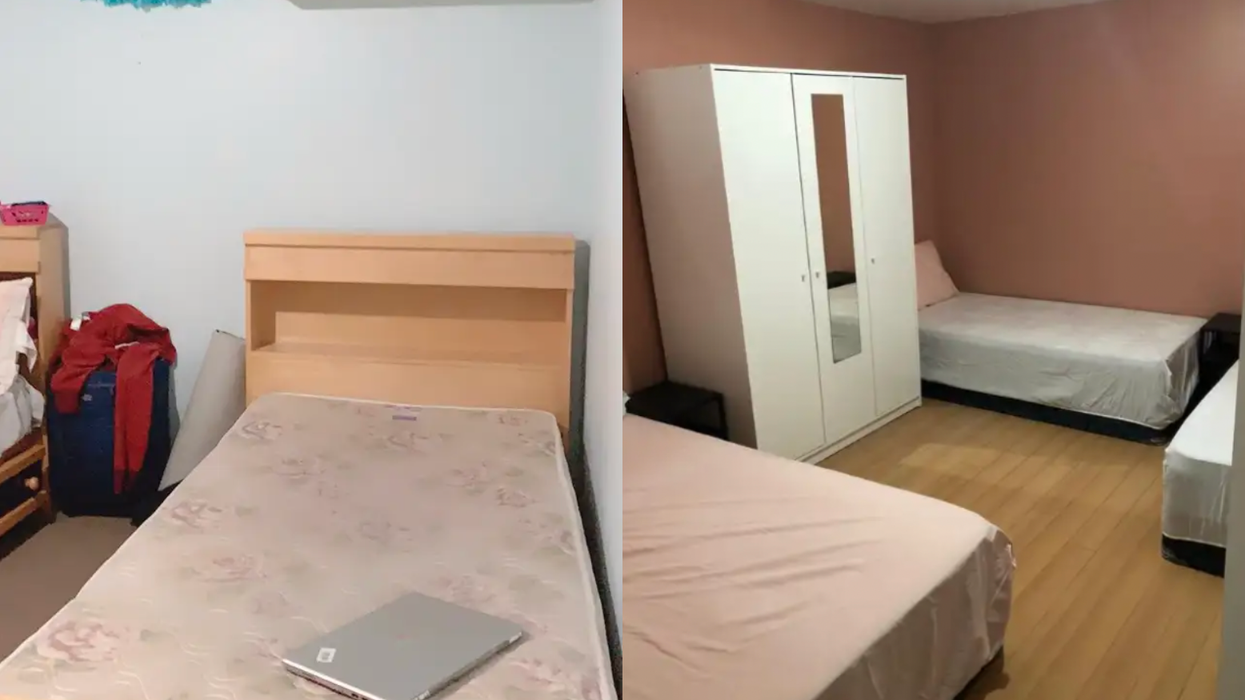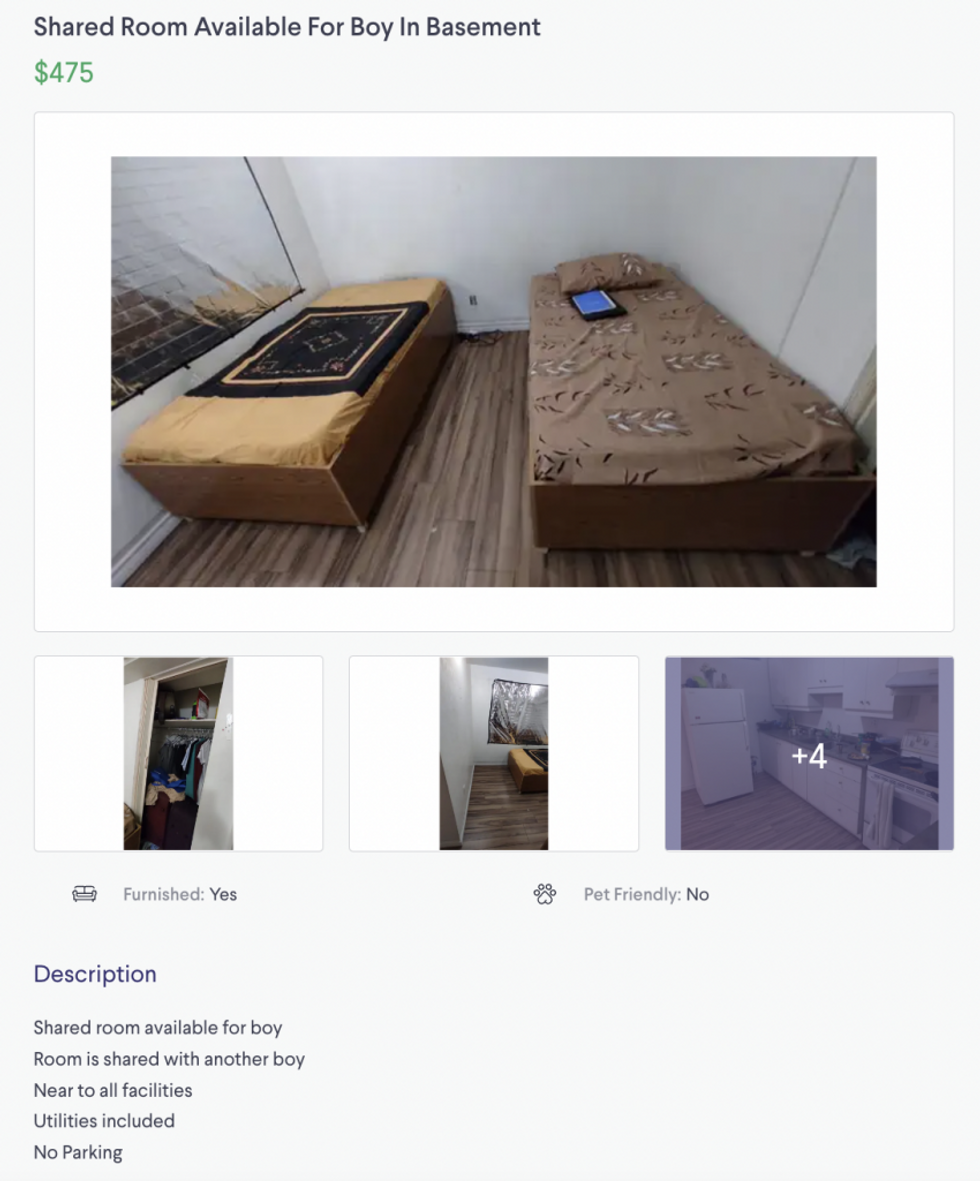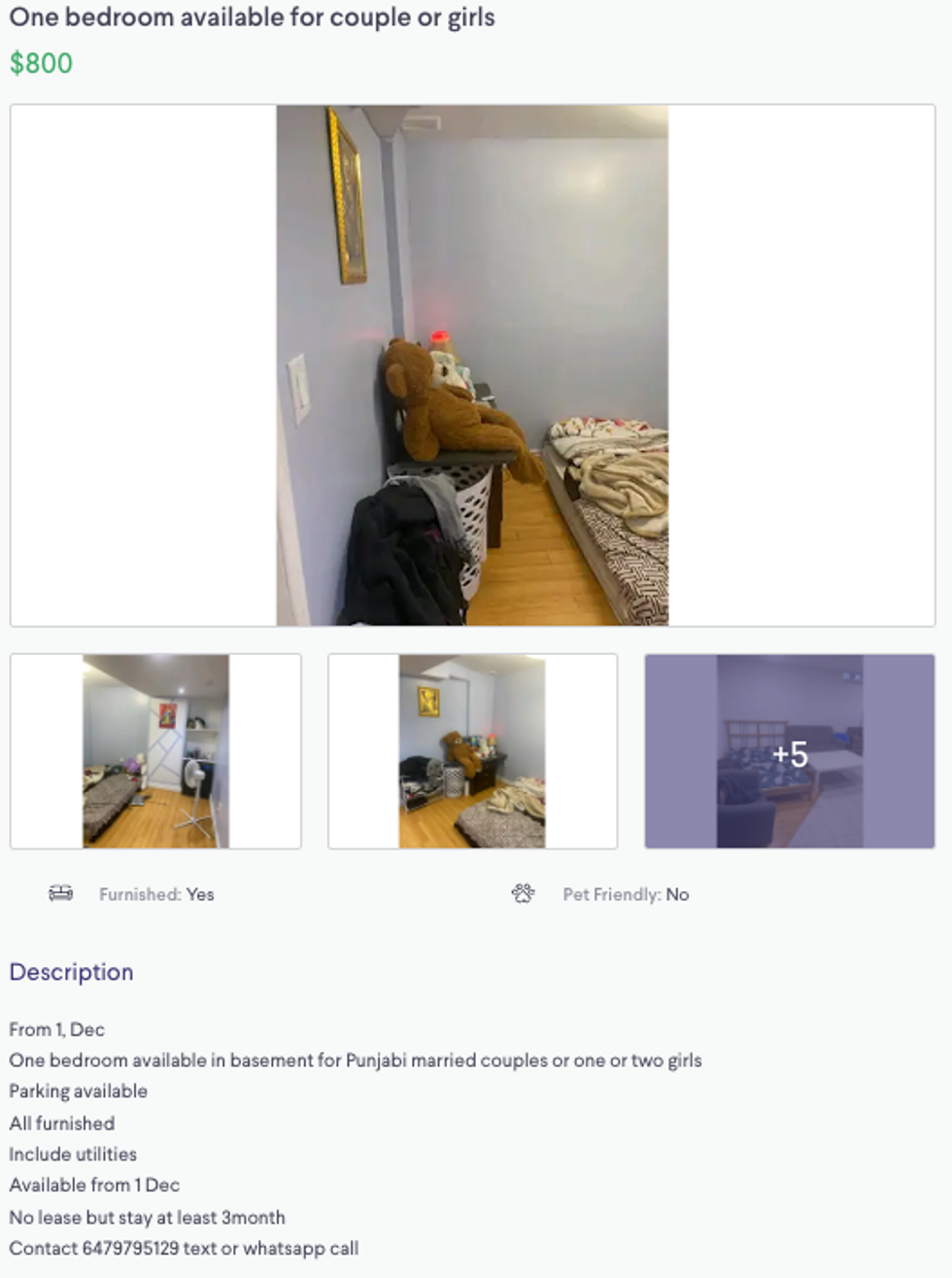A quick browse through rental listings in the Greater Toronto Area (GTA) posted on websites like Kijiji and Facebook reveals a plethora of small, shared basement apartments, many of which have overreaching, and sometimes downright illegal, asks. Some feature puzzling stipulations including "no guests without permission," "no alcohol," and even "no cooking with garlic." Others flat out ask for illegal security deposits and post-dated cheques.
Overwhelmingly, they appear to target an often desperate group of renters: students. Particularly, international students.
The cities of Brampton and Mississauga are riddled with these basement rental listings, advertising their proximity to popular schools like Sheridan College and University of Toronto Mississauga, and highlight their openness to renting to international students -- particularly those from India. Priced as low as $375 per month, these listings seem otherworldly when compared to the $2,089 average rent price seen in Mississauga in September.
Although the low prices may be enticing to students looking to save money, the conditions of these rentals are often substandard. While some do offer full rooms for rent, many listings show two or even three beds crowded into a room, some of which do not appear to have windows or closets. One Brampton listing, asking $475 per month, included photos of two twin beds inside a small, windowless room with a reflective tapestry plastered on the wall in an apparent effort to give the room more light.
Many of the listings have extremely specific criteria for potential renters, ranging from ethnic requirements to gender requirements. One $650 listing for a room in a Brampton basement, for example, asks for a vegetarian, female renter, who can clean the apartment, and has no males over on a "frequent basis."
Demands for no guests, in general, are quite common, as are restrictions against drinking alcohol or using drugs of any kind. One listing even specifies that no smells are allowed, while another says it would like a tenant "from a humble background."
Brampton, in particular, has long dealt with a plethora of illegal, unregistered basement rentals -- something City Councillor Jeff Bowman tells STOREYS he has spoken out about for a number of years. In 2019, after a man died in a fire inside an illegal basement unit, Bowman sent a letter to the provincial government requesting additional powers for city enforcement to be able to enter and inspect units, but nothing ever came of it.
"In Brampton, we've got an explosion of illegal basement apartments, and the aspect of safety always has to be considered for anybody, especially those people who are in need of affordable housing," Bowman said. "Back in 2019, I believe we had a total -- since I became a counsellor in 2014 -- of over 50 fires in the city that involved basement apartments. Of those, over 90% of them were unregistered, illegal units."
Brampton and Mississauga both require that all secondary units be registered with the City and comply with specific health and safety standards. But as recently as 2020, Brampton City Council members estimated there to be anywhere from 20,000-30,000 illegal basement rentals in the city. Even a Brampton-based MPP, Amarjot Sandhu, was charged with operating two unregistered basement units back in 2018.
A Tighter Rental Market Leaves Less Room to be Picky
Sunand Sharma, Sheridan College's Associate Dean of Community Citizenship, Leadership, and Engagement, says that students finding safe, legal rentals in the Brampton and Mississauga area has been a point of concern for years. And with exceedingly stiff competition in GTA rental markets making available units scarcer and prices even higher, locking down a place to live has become extremely challenging.
"Students are finding it extremely difficult," Sharma told STOREYS. "And with such a tight rental market and extremely low vacancies in the GTA, for some, the only option they have is to be in a basement apartment."
Although Sharma notes there are certainly many legal, registered units that are great options for students, he's seen what can happen with an unregistered rental. Situations that have arisen with students and below-board rentals in recent years have ranged from issues with landlords not carrying out proper maintenance, to unfair rent increases, to forced evictions during the pandemic.
"We are hearing from students that some of the situations are compromising. Some of the situations aren't what they signed up for," Sharma said. "A lot during the pandemic were about not adhering to max vacancies."
In addition to a tighter market, Sharma says that a lot of the time, students aren't fully aware of their rights as a tenant, which can lead to predatory landlords taking advantage. Looking through classified ads, it's not hard to find basement listings asking for everything from post-dated cheques to security deposits -- both of which are not allowed in Ontario. One unit listed on Kijiji asked for cash-only payments, while another advertised that there would be no lease.
Students who do find themselves in these unregulated units are often scared to make complaints about their living situation due to the illegal nature.
"We've even seen some extreme cases where the landlords have asked for their passports and hold on to their passports while they're paying rent," Bowman said. "I mean, are you going to take the chance and say anything if there's the chance that your passport might be gone?"
Working Against the Bad Actors
To get ahead of the issue and prevent students from ending up in an illegal basement unit in the first place, Sheridan makes every effort to educate students on what to look for. With international students often coming in blind to the Ontario rental market, Sheridan begins sharing housing education information with them 14 weeks before they're due to arrive at school, laying everything from what their rights are to what to look out for.
Brampton and Mississauga allow the public to look up registered basement units, which is an easy first step to make sure the rental a student is interested in is legal. Sheridan also offers a platform where legitimate landlords can advertise their rentals.
"But due to the national housing crisis, some folks don't have the liberty to find [a rental] through our platform," Sharma said. "They will go through a word of mouth or classified ads which, unfortunately, bypasses what the institution can do."
If a student does choose something off-platform, Sharma advises cross referencing it with the registered units list.
Apart from education, Bowman says there needs to be stronger enforcement allowed on a municipal level. Ontario's Ministry of Municipal Affairs and Housing confirmed to STOREYS that "municipalities may establish and enforce bylaws for property standards, including maintenance standards for rental housing," and added that "where a municipality finds a basement apartment to be illegal, they can order that the unit be vacated." The reality when it comes to enforcement, however, is not as straightforward, Bowman says.
"For a bylaw officer to go into a house for safety inspections, they have to be invited in by somebody -- they couldn't go in on their own, even knowing that there might be 14, 15, 16 people living in the house unsafely," Bowman said.
The alternative is that officers obtain a search warrant for the property -- something Bowman sees as prohibitive.
"I'm not looking for carte blanche, I'm not looking for search and seizure. I'm looking for an easier route for our bylaw officers to get in and inspect for safety to ensure that we are never in a situation where we have loss of life because of illegal units," Bowman said. "We've got approximately 20,000 illegal basement apartments in the city and the Minister of Municipal Affairs is telling me to go and get a search warrant for 20,000 basement apartments."
The idea of having to apply for all of those warrants when court systems are already backed up, prolonging unsafe living situations even further, is ridiculous, Bowman said.
"We're having more and more complaints from people living next door to them, you know, garbage piling up in the backyards and 15, 16 people living in in one location with cars parked all over lawns and things like that," he said.
In an instance where a bylaw officer is given access to a property and finds an illegal unit, landlords are often given the opportunity to bring the unit up to code and apply for a permit. Those who don't can be issued fines up to $25,000 for individuals or $50,000 for a corporation.
One positive sign is that Brampton has seen an uptick in the number of applications for secondary unit registrations, with Bowman saying they received around 11,000 in 2021 alone.























